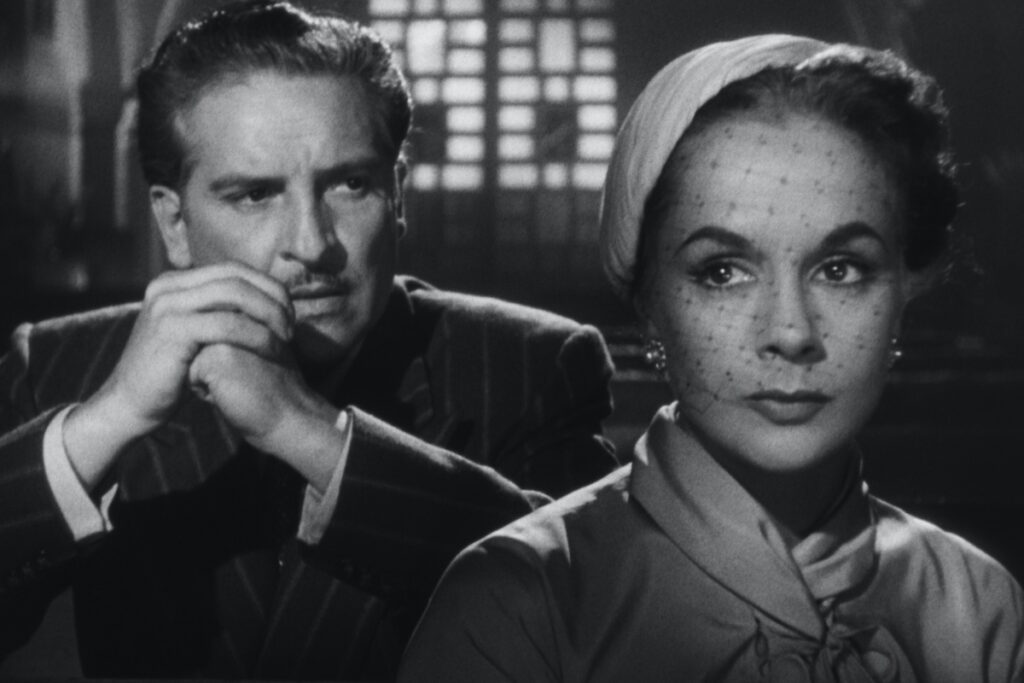Luis Buñuel’s 1953 Film ‘Él’ Tackled Machismo in Marriage, and Shocks Even Today
Cinephiles looking for a vintage dark drama of obsession and gaslighting may want to hoof it to Manhattan’s Film Forum — with the proviso that they should be prepared to be jolted by moments of madness and sadism.

Iconic iconoclast Luis Buñuel directed nearly 30 feature films, and though they span different genres and production nuclei — Mexico, France, and his native Spain — nearly all share critiques of the Catholic church, upper class society, and patriarchy.
One of his lesser-known Mexican movies, 1953’s “Él” (“Him”), also called “This Strange Passion,” recently underwent a 4K restoration, and cinephiles looking for a vintage dark drama of obsession and gaslighting may want to hoof it to Manhattan’s Film Forum starting Friday — with the proviso that they should be prepared to be jolted by moments of madness and sadism.
Buñuel’s sensibility appears right from the film’s opening shot of a mighty church bell next to a pillar scratched with graffiti, combining his trademark imagery of the sacred and the profane. Soon, the viewer is placed inside the church on a Holy Thursday, as the pastor washes the feet of young parishioners. A handsome middle-aged man named Francisco Galván de Montemayor, a lay member of the ceremony, does his own pedal appraisal and lands on the petite, tastefully shoed feet of Gloria, a youngish woman. The two don’t officially meet until a little later, once again in the church, but it’s clear that Francisco is quite taken with Gloria, even after he finds out she’s engaged to Raul, one of his friends.
A quintessential film noir tone is established early on through the male characters’ pinstriped suits, Gloria’s seductive air of mystery, and Francisco’s shadowy Mexico City mansion — particularly its clashing interior design mixing art nouveau curlicues, hacienda style, Catholic iconography, vaguely Moorish motifs, and bulky Victorian furniture. Francisco’s father designed the home himself, and we learn that his wealth stems in part from extensive property in his hometown of Guanajuato, though he’s currently embroiled in a contentious lawsuit over land titles.

Guanajuato is where Francisco and Gloria go on their honeymoon, after the tenacious landowner manages to steal her away from Raul. It’s on this trip that Gloria realizes she married an insecure, jealous, paranoid man, with their honeymoon night marred by his pseudo-priestly pleas for her to confess her past loves, and their sightseeing twisted by his suspicions of other men, photographic egoism, and general superiority. Still, during a dinner, Gloria admits her love of his power, though she comes to regret this when the film implies that he physically hurts her in their hotel room in a fit of rage. Upon returning to the capital, she essentially becomes a prisoner in the house, not allowed to see anyone, including her mother.
Buñuel based his screenplay on Mercedes Pintos’s 1926 hybrid autobiography/novel but added details from his own sister’s abusive marriage. He even acknowledged, albeit many years later, that “there is something in me in the protagonist.”
Perhaps this explains the psychological insight with which the film tracks Francisco’s mental collapse. It takes a deeply disturbing look at machismo — which some may call toxic masculinity — and how even its most civilized form leads to physical, mental, and possibly sexual abuse, with several shocking moments. Yet it also attempts to explain and contextualize Francisco’s actions, which might turn off some modern viewers with little patience for rationalizations of male arrogance and aggression and the female characters’ tendency to forgive.
As Gloria, Argentine actress Delia Garcés persuasively personifies a woman who, however self-possessed and intelligent, is unable to extricate herself from a bad relationship. Ms. Garcés looks a bit like Susan Hayward, with her short hair and mien also recalling Audrey Hepburn, and she is luminous throughout. Yet it is Mexican actor Arturo de Córdova as Francisco who is the movie’s focus, despite many scenes being narrated by Gloria via flashback. Mr. Córdova humanizes the monster, showing us how his preoccupations with legacy and social standing derive from his upbringing and religious piety. Francisco has a God complex and can be controlling and extremely cruel, but the actor nonetheless makes one sympathize for the character as he increasingly “loses it.”
As the film heads to its climactic scene, in the church of course, Francisco’s growing schizophrenia allows Buñuel to add some of his characteristic surrealistic touches, which feel appropriately nightmarish rather than playful when applied to a thriller plot. The story’s fairly conventional structure and filmmaking approach mean that “Él” doesn’t reach the category-defying artistic heights of some of his other black-and-white features, such as “Viridiana” and “The Exterminating Angel,” to say nothing of his late color masterpieces like “The Discreet Charm of the Bourgeoisie.”
Still and all, as a classic example of marital manipulation, and in its anticipation of the themes and some imagery from Hitchcock’s “Vertigo” from 1958, Buñuel’s film not only stands as a taut, still-relevant exploration of male psychosis and destructive core values, but has solidified its standing in movie history.

